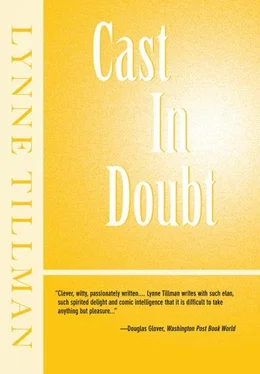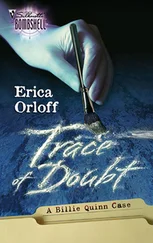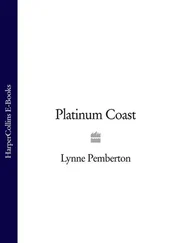Instead of blurting out, again, But why would John lie to me? I ask, but what about Helen’s abortion? I am impatient. Gwen never inquired.
I can’t imagine he’d care, Lulu. Or if he cared, he’d never admit it — he’s too cool, rehearsing hard to be cool. He’s a lapsed Catholic, after all, and it’s his mother he’s in love with. And she didn’t abort him, at least not in the usual sense, n’est-ce pas? Alicia is the perfect mom but that’s why he can’t get it up with her, it’s obvious. Quel obvious. With us, anyway, it was a long night and then day and then night. He was all right with me, not for long, but he was able to, as we say, enter, to do it, and then he cried. It was bad and sad. He collapsed on me and whimpered like a puppy. I don’t think I could go through it again. We talked. Or I talked.
Gwen galloped on. She reminisced about sex with the mentally sick musician she loves, for eternity, it seems, how great it and he were, how disappointing bad sex was, then she backtracked and recalled that Alicia had been waiting up for John, so that she — Gwen — was a surprise, yet Alicia took it all gracefully, at first.
We had civilized conversation, Lulu, some laughs for a while, we drank ouzo and ate bread and cheese, that mestizo — your get-your-goat cheese — fabulous. The evening was pleasant, if a night like the one I finally had could ever be considered pleasant, even in retrospect, or if any night is pleasant, Lulu, considering the peculiarity of modern nights.
Ultimately I believe Gwen segued to pictures. I suppose it had to do with her conjuring pleasant images after describing the pleasantries between her and Alicia. Gwen finds art restorative simply because it isn’t life or even like life. The more artificial it is, the better Gwen likes it. She admires Warhol precisely because of the falsity of his work, which actually makes it true, to her way of seeing and thinking, which is not mine. To her Warhol is the modern-day equivalent of Rembrandt, doing precisely what the Dutchman did in the seventeenth century — painting the rich and advertising them and their possessions. She’s rather adamant about all this. I don’t see it her way. Gwen next expounded on “Le Déjeuner sur l’Herbe”—perhaps the three of them, Gwen, John and Alicia, had had a nude picnic on Alicia’s floor? — and how that painting made Gwen crave, to eat ravenously or to make love, because in its center was an empty space as great as lost love, a hole that the figures created through their position, they encircled it, and had I never noticed it…?
But the mention of absence made me think of Helen and about whether or not to leave immediately for the south. The phrase — the south of Crete — had a resonance it had never had before. The South. I was lost in thought for a moment or two, and then, as if a heavy curtain had been pushed aside roughly, I perceived an expression on Gwen’s face that alarmed me. I had never seen it before. At least I was not aware that I had.
Are you all right? I ask her, furiously turning my attention to her, to focus on her, on her pain, her putative trouble, her fugitive absence from New York. I believe this surprised my dear friend. This sudden intensity may not have been like me. Or perhaps it was irregular for me to admit such concern.
Gwen assures me she is absolutely fine and insists grimly that it is because she can laugh. But she was not laughing when she spoke.
I can always laugh, Lulu, and as long as a person can laugh, a person can survive, in a manner of speaking, even as one is peaking, which I am. Peaking, peek-a-boo, here comes another gray hair. It is funny beyond endurance, n’est-ce pas? Sometimes I laugh myself to sleep. Sometimes I laugh so hard I begin to pant and lie panting on the floor, hysterical. Completely hysterical. In the best sense of the word, of course. This is the flip side to my unhappiness, ordinary or otherwise. It can always be said of me, Gwen maintained her sense of humor. It could be a badge, a badge of honor, or it could be engraved on my tombstone: she’s grave here but she laughed until she died. I have fun, Lulu, I really do, in spite of my misery. I am determined to stay amused. I hate to be bored. To liven things up — this will horrify you, Lulu — I even smoke grass occasionally, though rides on subways, which I avoid as much as possible, subway rides are très treacherous. When I’m stoned, people look like so many different kinds of animals. And I can’t stop myself from laughing. People’s faces are très bizarre, aren’t they? We’re all jammed together — one great jam in New York. Here, the faces are so boringly similar except for what colonialism the cat brought back. You could call that the return of the oppressed. For me, alcohol is the superior high.
With that Gwen drains her glass of its wine and eyes me expectantly. But, I ask, is there anything objectively wrong? Are you being hounded by landlords, drug lords, have you done something unspeakable, is there something appalling, so awful that you’re not able to break it to me? I guffaw nervously, so that neither of us has to take the question seriously. She chuckles merrily, then again looks glum, her lips turning down to that fateful position, the grimace, which is her natural pose, her normal expression in repose. This guise of normality quiets me, and I feel at ease. I refill her glass and mine.
We look at the harbor. The moon is resolute and unshaken above the horizon line. The night is eerily peaceful, and for a long while we hear only the slap of the waves against the wharf and the strains of bouzoúki music in the distance, probably emanating from the sole disco in town — one of the young Greeks had opened it, though bouzoúiki music wouldn’t have come from there. I don’t know where the sounds are from.
Lu-lu, Gwen pronounces grandly, even portentously, letting the two syllables linger, nearly languish, on her tongue, Lu-lu, of course someone’s after me, someone’s after you too — Mr. Death, and he’s carrying a big scythe, swinging it in huge strokes across the landscape, he’s wearing a gray gown — I adore gray — and he’s marching across Atlanta, the city’s on fire, like Watts, or he’s coming in from the wheat fields. Save me, it’s a Grant Wood painting. It’s titled: Death doesn’t take it on the chin. Death isn’t on the lam, or death goes out on a limb, death’s limber and portable…
Stop, stop. All right, all right, I command, laughing. I exhort her that, yes, death is certainly marching nearer, but to me, not to her. You are still a child, I tell her, just one of your tots, an amazing, adult child. To me, you always will be. And in the natural course of things I will pass on to my reward before you, and you will dance at my funeral. I want you to, I implore her, in addition I want you to wail. That is my plea. It will even be in my will! Then I take Gwen’s hand in mine and hold it tight.
Gwen’s hand was like ice in my own. I will never forget that moment or that sensation, her small, icy hand in my hot puffy one. As the moon, implacable in its unearthly place and as perfect as an illustration in a fairy-tale book, shone down, Gwen made light of death with more of that invocatory talk of death’s riding in from a fiery Atlanta, but I think this time she improvised upon another theme — Mr. Death was traveling Greyhound and absolutely everyone on the bus wanted to die.
It was my belief that that night Gwen and I invoked — no, provoked — death, woke him up, that we stirred that specter of mortality. He had been sleeping quietly above our heads. Death needn’t take the shape or form, or need the time, one thinks it will. Gwen taught me that. For instance, she had often insisted that it was an act of hubris on man’s part to have created perspective, to have placed the eye, and by dint of that to have placed human beings, in the center of a series of lines and planes, in the center of being. I remember well that Gwen scowled exaggeratedly at my use of the words natural and human nature. She mocked the idea of the natural order, which she did, and had done, over the years in conversation with me.
Читать дальше












